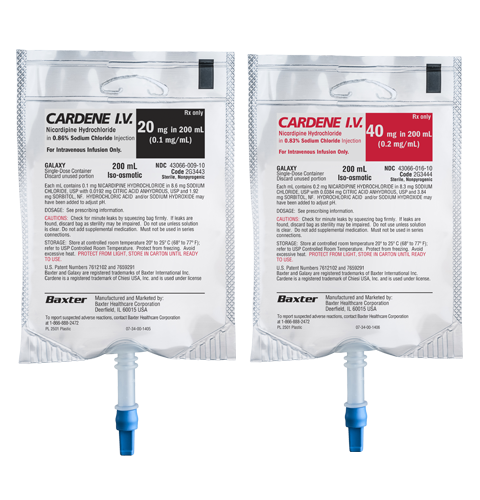CARDENE I.V. (nicardipine hydrochloride) Injection

Indication
CARDENE I.V. (nicardipine hydrochloride) is a calcium channel blocker indicated for the short-term treatment of hypertension when oral therapy is not feasible or not desirable. For prolonged control of blood pressure, transfer patients to oral medication as soon as their clinical condition permits. Please read the accompanying full Indication(s) and Important Risk Information and full Prescribing Information.

Rapid Acting and Easily Titrated 1
CARDENE I.V. can be stored at the point of care at room temperature of 68-77oF (20-25oC) in its original carton and protected from light until its administration.1 CARDENE I.V. (nicardipine HCl) acts rapidly and blood pressure begins to fall within minutes, and the formulation allows for rapid (q 5 min) or gradual (q 15 min) titration.1
Manufacturer-prepared
Ready to administer bags
Two-year shelf life at room temperature
Can be stored at point of care
Store in carton to protect from light until ready to use

An antihypertensive agent that fits your patients’ needs
CARDENE I.V. has documented efficacy in different clinical settings in treating patients with acute severe hypertension or acute postoperative hypertension.1

Selected Important Risk Information
● CARDENE I.V. is contraindicated in patients with advanced aortic stenosis.
● If unacceptable hypotension or tachycardia occurs, discontinue the CARDENE I.V. Infusion. When blood pressure and heart rate stabilize, restart the infusion at low doses.
Please read the accompanying full Indication(s) and Important Risk Information and full Prescribing Information.
Explore Our Related Products
CARDENE I.V. (nicardipine hydrochloride)
20 mg in 200mL (0.1 mg/mL) in 0.86% Sodium Chloride
40 mg in 200mL (0.2 mg/mL) in 0.83% Sodium Chloride
Indication and Important Risk Information
Indication
CARDENE I.V. is a calcium channel blocker indicated for the short-term treatment of hypertension when oral therapy is not feasible or not desirable. For prolonged control of blood pressure, transfer patients to oral medication as soon as their clinical condition permits.
Important Risk Information
Contraindications
Do not use in patients with advanced aortic stenosis.
Warnings and Precautions
- Exacerbation of Angina: Increases in frequency, duration, or severity of angina have been seen in chronic therapy with oral nicardipine. Induction or exacerbation of angina has been seen in less than 1% of coronary artery disease patients treated with CARDENE I.V. The mechanism of this effect has not been established.
- Exacerbation of Heart Failure: Titrate slowly when using CARDENE I.V., particularly in combination with a beta-blocker, in patients with heart failure or significant left ventricular dysfunction because of possible negative inotropic effects.
- Increased effect with Impaired Hepatic Function: Since nicardipine is metabolized in the liver, consider lower dosages and closely monitor responses in patients with impaired liver function or reduced hepatic blood flow.
- Prolonged effect with Impaired Renal Function: When CARDENE I.V. was given to mild to moderate hypertensive patients with moderate renal impairment, a significantly lower systemic clearance and higher area under the curve (AUC) was observed. Titrate gradually in patients with renal impairment.
- Local Irritation: To reduce the possibility of venous thrombosis, phlebitis, local irritation, swelling, extravasation, and the occurrence of vascular impairment, administer drug through large peripheral veins or central veins rather than arteries or small peripheral veins, such as those on the dorsum of the hand or wrist. To minimize the risk of peripheral venous irritation, change the site of the drug infusion every 12 hours.
- Adverse Reactions: Most common adverse reactions are headache (15%), hypotension (6%), tachycardia (4%) and nausea/vomiting (5%).
- Drug Interactions:
- Cimetidine has been shown to increase nicardipine plasma concentrations with oral nicardipine administration. Frequently monitor response in patients receiving both drugs.
- Oral or intravenous nicardipine may increase cyclosporine and tacrolimus plasma levels. Frequent monitoring of trough blood levels of cyclosporine and tacrolimus is recommended when co-administering CARDENE I.V.
- Pregnancy: Based on animal data may cause fetal harm. CARDENE I.V. should be used during pregnancy only if the potential benefit justifies the potential risk to the fetus.
Dosage and Administration
- If unacceptable hypotension or tachycardia occurs, discontinue the CARDENE I.V. infusion. When blood pressure and heart rate stabilize, restart the infusion at low doses.
Please click here for full prescribing information


